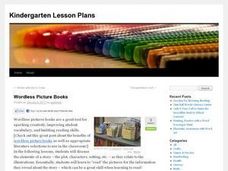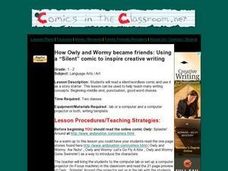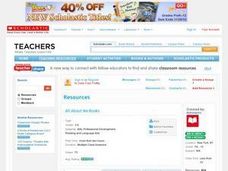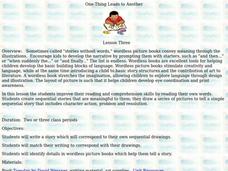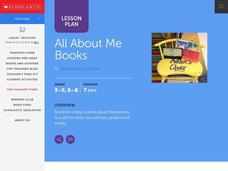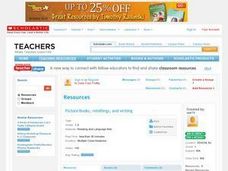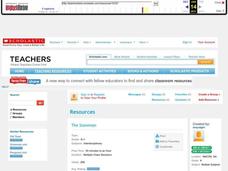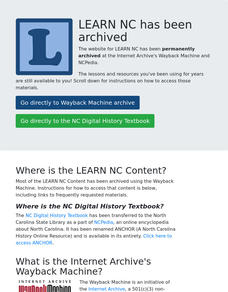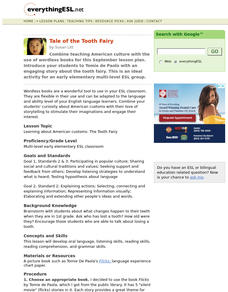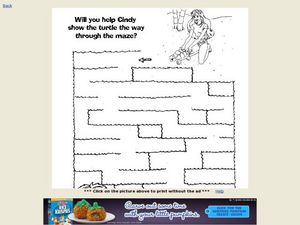Curated OER
Using Wordless Comics To Help Create Meaning in Reading
Use picture cues as a tool in order to create meaning along with text. With a wordless comic, young illustrators discuss the main idea and character traits, and independently write a summary for a page of a wordless comic. This strategy...
Curated OER
Wordless Picture Books
Students use wordless picture books to examine elements regarding a story, the plot, and characters. In this wordless picture books lesson, students select a book to creatively discuss. Students then listen to the teacher read the story...
Curated OER
Picture This!
Students explore and generate story elements for wordless picture books. In this collaborative writing lesson, students review wordless picture books and write a story based on the illustrations. Students use post-it notes to organize...
Curated OER
How Owly And Wormy Became Friends: Using a Silent Comic To Inspire Creative Writing
Students view a wordless comic before using it as a story starter. They access a story that uses the same characters at a website in order to better understand the nature of the characters. They write a story inspired by the comic and...
Curated OER
All About Me Books
Students examine literature of emergent readers, categorize books into types of literature common for primary readers (wordless, pattern, alphabet, number, rhyme, etc.), and write a book about themselves to give as gifts to their new...
Curated OER
One Thing Leads to Another
Students analyze the storytelling methods in wordless books. In this visual storytelling lesson, students write a story that correspond to a specific wordless picture book. Students create their own wordless picture book after...
Curated OER
All About Me Books
Young authors write books about themselves using one of the identified types of literature and the writing process. They identify the common characteristics among the books in each group, edit, and gift their books to a younger student.
Curated OER
Quiet on the Set!
In pairs learners perform a silent skit portraying relationships between two known characters from a popular book or a play for their classmates. Next, the class will read and discuss a NYTimes article about a film school in the Bronx...
Academy of American Poets
The African American Experience
Disrespect can be as subtle as a frown or a turn of a head. To prepare for a study of Toi Derricote's poem "The Weakness" class members create wordless skits that demonstrate subtle or not so subtle signs of disrespect. After a...
Curated OER
Picture Books, Retelling, and Writing
Students create stories using only pictures. In this visual storytelling lesson, students read Pancakes for Breakfast by Tomie de Paola and analyze the wordless story. Students create new text for the book by writing on sticky notes.
Curated OER
Picture This
Students, after explaining the famous quote, "A picture is worth a thousand words," supply the missing words to a wordless story by Mercer Mayer called "A Boy, A Dog, and A Frog." They brainstorm the setting, plot, descriptive words,...
Curated OER
The Snowman
Students view the wordless book The Snowman. In this Snowman book lesson, students discuss the events in the pictures of the book. Students write a sentence with illustration to respond to the book. Students paint CD's and create a...
Curated OER
Activity Plan 5-6: Let's Create Stories!
Pupils examine wordless books and other pictures in order to learn how the teacher "reads a picture" to tell a story about it. In this early writing lesson, students then create their own picture for story telling by painting. Pupils...
Curated OER
What's the Point? A Lesson on Point of View
Fourth graders read the book, Good Dog by Alexandra Day. In this writing lesson, 4th graders re-write the story from a chosen character's point of view. This lesson can be used with many other wordless picture books.
Curated OER
Tale of the Tooth Fairy
Students share social and cultural traditions and values. They develop listening strategies to explain what is heard.
Curated OER
Mother Owl Cartoon
In this owl cartoon worksheet, students enjoy a wordless cartoon story about an owl mother and her babies. It is somewhat difficult to understand the moral. There are no directions.
Curated OER
Can You Show Jack the Way Down the Beanstalk
In this Jack and the Beanstalk maze learning exercise, 1st graders show Jack the way down the beanstalk by completing a maze. This is a wordless learning exercise.
Curated OER
Harp Maze
In this Harp maze activity, 1st graders complete a maze by drawing a line from the start to the finish openings. This is a wordless activity.
Curated OER
Help the Cat Find the Fence
In this maze worksheet, 1st graders draw a line from the start openings to help the cat find the fence. This is a wordless worksheet.
Curated OER
Hen Maze
In this maze instructional activity, 1st graders complete the maze by showing the hen the way back to the barn. This is a wordless instructional activity.
Curated OER
Will You Help Cindy Show the Turtle the Way Through the Maze?
In this maze worksheet, student draw a line from the beginning to help Cindy show the turtle the way through the maze. This is a wordless worksheet.
Curated OER
Fall in Love with the Library of Congress
Introduce your class to this special library while simultaneously addressing the Common Core State Standards.
West Corporation
Making Inferences – Use Your Mind to Read!
How can you tell if someone is happy? The lesson works with elementary and middle school scholars to activate their schema and pay attention to details to make inferences in their daily lives, poetry, and other literature. Cleverly...
For the Teachers
Sequence Plot Chart
Your kids can identify the plot sequence of a short story, but what about an informational article? Have them examine the chronological order of events in informational texts with a lesson on the sequence of events.
Other popular searches
- Wordless Picture Books
- Wordless Books
- Wordless Picture Books Zoom
- Wordless Comics
- Wordless Picture Books Esl
- Wordless Stories
- Wordless Books Lesson
- Sample Wordless Books



